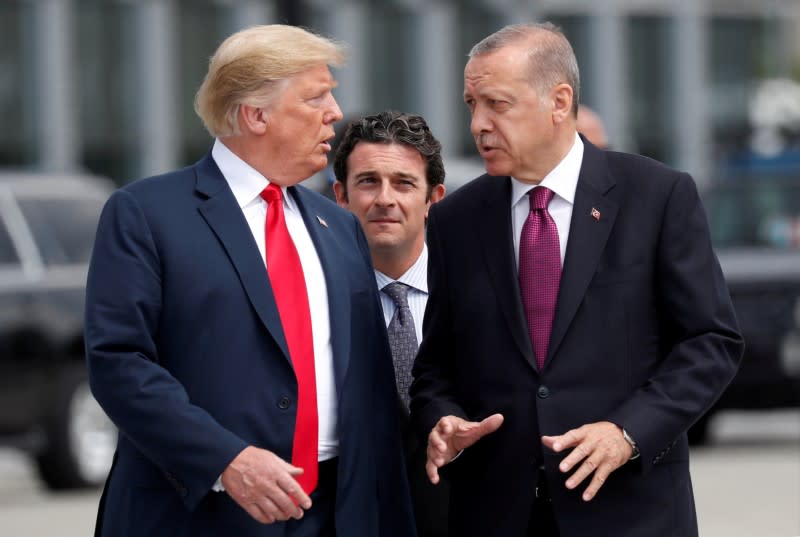What the collapse of Turkey's currency means for the US and the rest of the world
The selloff in Turkey’s lira currency has investors worried about potential contagion from the U.S.’s North Atlantic Treaty Organization (NATO) ally and prospective European Union member.
The lira fell by around 20% in trading on Friday after a tweet from U.S. President Donald Trump that he would compound the country’s troubles by slapping additional tariffs on goods exported to the United States.
Turkey’s currency (TRY=X) had already fallen to its lowest level on record Thursday and was sinking further on Friday prior to the tweet. Turkish President Recep Tayyip Erdogan has eroded investor confidence by piling up debt and many accuse him of meddling in the decisions of the central bank in an attempt to stimulate the economy.
Turkey’s problems go beyond troubled finances
The problems in Turkey are the tip of the iceberg in a global financial system that is rife with bad debt, says George Friedman, an author, international affairs strategist and founder of Geopolitical Futures. He argues that governments around the world are still trying to bounce back from the 2008 financial crisis.
“Governments are trying to rebalance politically to this and that causes them to borrow money carelessly,” he said. “One reason you saw the dollar surge today on international markets against almost all currencies is because there is global contagion here, there is a weakness from 2008 that still hasn’t been cured and there’s fragility to the global market that Turkey is tapping into.”
While Trump took the opportunity to pile on with his tweet Friday, investors say the root problem with Turkey is simply bad governance.
“Erdogan hasn’t made many friends, he’s taken a very antagonistic approach to the West and vice versa, and it’s sort of the perfect storm of poor economic fundamentals … in the context of a broad-based [emerging market] selloff,” said Win Thin, global head of emerging market currency strategy at Brown Brothers Harriman. “It’s underperforming and getting hurt disproportionately because it’s one of the most vulnerable EMs.”
Thin calls the issue of U.S. pastor Andrew Brunson, who was arrested in Turkey in 2016 and faces terror and espionage charges, a “side show” in the eroding relations between Turkey and the United States.
The day’s market action showed that when the market is fearful, investors are still turning to the U.S. dollar and U.S. Treasuries. The dollar index (^USDOLLAR), which measures the greenback’s strength against a group of six major currencies, rose around 1% to its highest level since July 2017. Prices on the benchmark U.S. 10-year Treasury note (^TNX) rose, with the yield falling to its lowest since July 20.
The bridge between East and West
The principal worry for the U.S. and allied partners is what Turkey’s looming crisis could mean in the effort to battle ISIS and the still simmering conflict in Syria. The situation there involves global powers including the EU, Russia, Iran and others. Turkey has been a longtime, if mercurial, U.S. ally in the region and Trump’s social media antagonism, as well as his sanctions on the country, put that support in jeopardy, Friedman of Geopolitical Futures told Yahoo Finance.
“The spinoff, as in any important financial issue, isn’t financial,” he said. “In this case it’s military and political. Turkey is a major player in the Middle East that’s engaged in war, what happens to that?”

The currency selloff could also impact global financial markets because of the exposure some of Europe’s largest banks have to Turkish debt. The European Central Bank’s bank monitor has reportedly become concerned about the exposure of some of the euro zone’s biggest lenders to Turkey, including BBVA, UniCredit and BNP Paribas, and has started to look more closely at that relationship, Financial Times reported Friday.
The fallout also has global implications as it’s the latest sign of the breakdown of the post-Cold War order of alliances, partnerships and treaties, said Karl Schamotta, director of FX strategy and structured products at Cambridge Global Payments.
“Turkey was very much part of Western alliances and functioning as bridge between East and West, and the fact that the bridge has fallen apart is worrisome,” Schamotta said. “It points to an elevated geopolitical risk in the future and I think that’s pretty meaningful, particularly for the Middle East and relations with countries like Russia.”
This article previously mischaracterized Turkey as a member of the European Union. Turkey has applied for membership, but is not yet a member of the EU.
—
See also:
Wall Street managers have cost Americans more than $600 billion over the past decade
It’s the end of the world as we know it, and investors feel bullish
The dollar’s status as the world’s funding currency is in question
Why Trump’s trade war hasn’t tanked the market or the economy yet
Dion Rabouin is a global markets reporter for Yahoo Finance. Follow him on Twitter: @DionRabouin.
Follow Yahoo Finance on Facebook, Twitter, Instagram, and LinkedIn.

